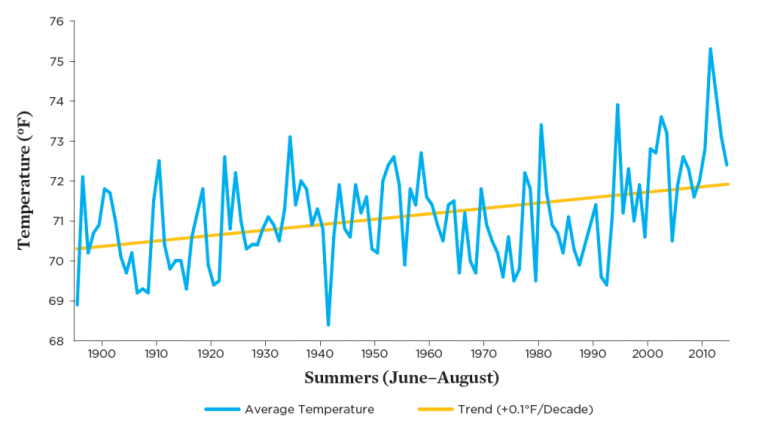New Mexico is the sixth-fastest-warming state in the United States, with average annual temperatures expected to rise 3.5 to 8.5 degrees Fahrenheit by the year 2100, according to a report released by the Cambridge, MA.-based nonprofit Union of Concerned Scientists.
The report lays out many of the impacts New Mexicans may already be familiar with, including temperature rises, decreasing water availability, changes in snowpack, wildfire, conifer dieoff from insects and drought, and impacts to tribal communities from post-Los Conchas fire flooding.
And it discusses the describes challenges posed to New Mexico culture, communities, and economic sectors–particularly the state’s agricultural sector.

Union of Concerned Scientists report: http://www.ucsusa.org/sites/default/files/attach/2016/04/Climate-Change-New-Mexico-fact-sheet.pdf
Summer temperatures in New Mexico vary from year to year, but a careful analysis shows a consistent warming trend—a trend that is projected to continue into the future. Since 1970, the trend has steepened to an increase of about 0.6°F per decade. (Source: NOAA)
But there are ways to deal with these changes, according to the report, that include both carbon emission reductions and “building resilience” within communities. Key solutions discussed in the report are:
-Reduce emissions from coal-fired plants in New Mexico, which ranks twelfth in the nation for per-capita carbon emissions from the energy industry.
-Increase investment in renewable energy, strengthen the state’s Renewable Portfolio Standard, and increase energy efficiency
-Work with other states and the US Environmental Protection Agency to implement the Clean Power Plan
-Make good use of information and invest in planning to handle the extreme conditions wrought by climate change
One of the UCS report’s authors, Jason Funk, noted in a blog the importance of using climate change projections, rather than “outdated historical information” when planning for the state’s water security.
Many of the report’s authors’ additional suggestions would require state government stepping up its efforts in monitoring the impact of climate change on water and natural resources, monitoring groundwater, and providing funding for statewide water planning.
These suggestions may be problematic, as the Martinez administration is currently not incorporating climate change data into statewide water planning. The administration released an energy plan last year that doesn’t mention the words “climate change,” and has refused to provide the position on climate change and the challenges it poses to New Mexico.
Lack of attention to the issues isn’t limited to the executive branch: The New Mexico State Legislature pulled funding for studies related to how drought might affect rivers, reservoirs, groundwater supplies, and the state’s economy.
The report specifically notes challenges climate changes poses to “low-income and socially vulnerable communities”, with particular discussion of the state’s agriculture sector. But communities economically reliant on energy production are also notably challenged, as impetus grows to shift away from industries that emit large amounts of carbon into the atmosphere.
Juan Reynosa, a field organizer with the Southwest Organizing Project in Albuquerque grew up in Hobbs, N.M., and knows how hard it is to make big changes when it comes to energy.
“We need a just transition,” he says. “Not only do we need a transition to cleaner and more sustainable energy, we also need to put the emphasis on the front-line communities that have already been impacted by the extraction industry.”
It’s hard for rural communities — like those in southeastern New Mexico or on the Navajo Nation — to undertake the changes that would come with reducing carbon emissions. “From someone who grew up in an extractive community, it’s hard to really be able to look at the environmental impacts with a clear eye when the roof over your head is due to the extractive industry,” he says. “It’s a tough thing for those communities.”
Thank you for giving the info. It’ll help me
bunch.